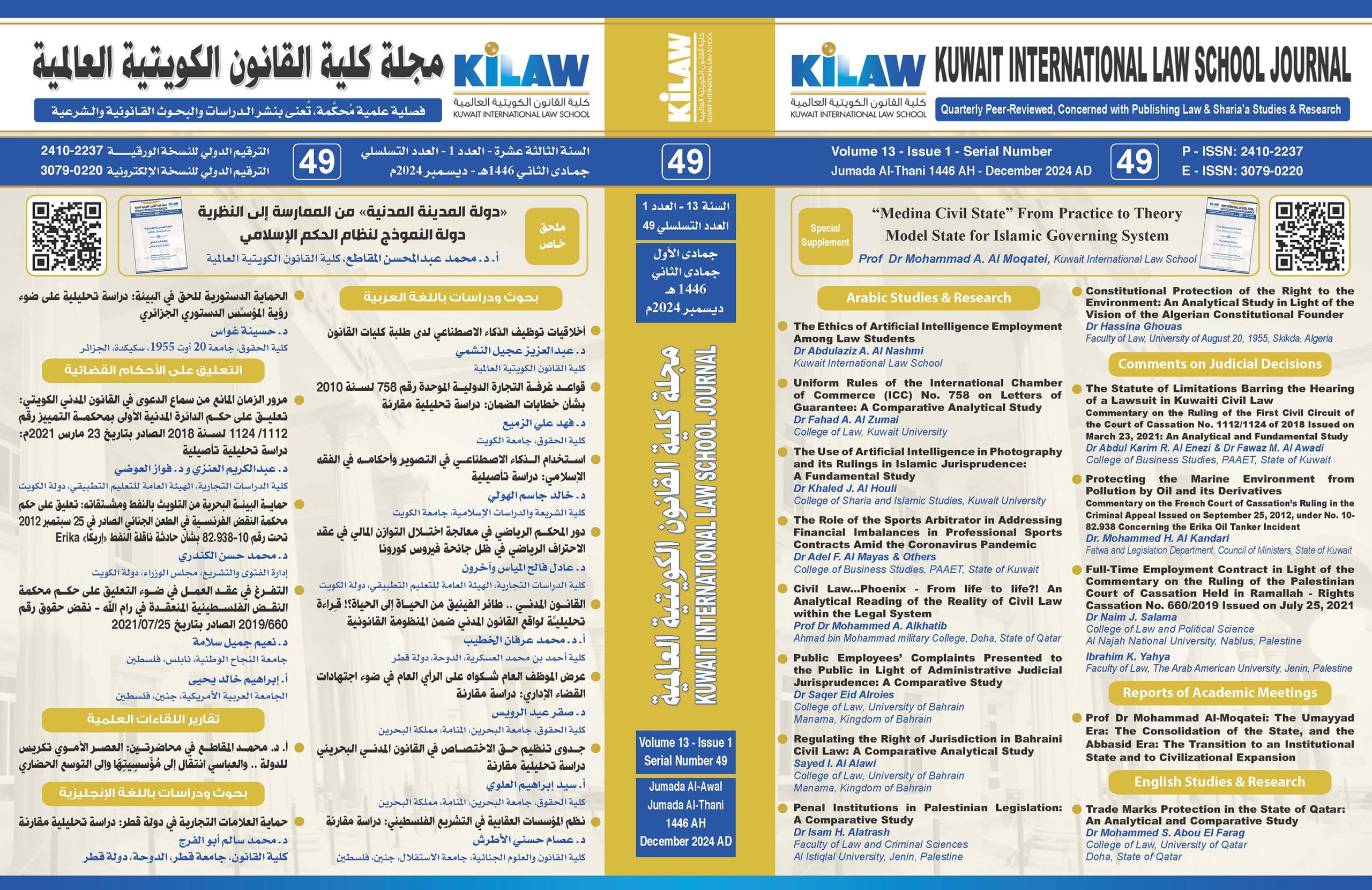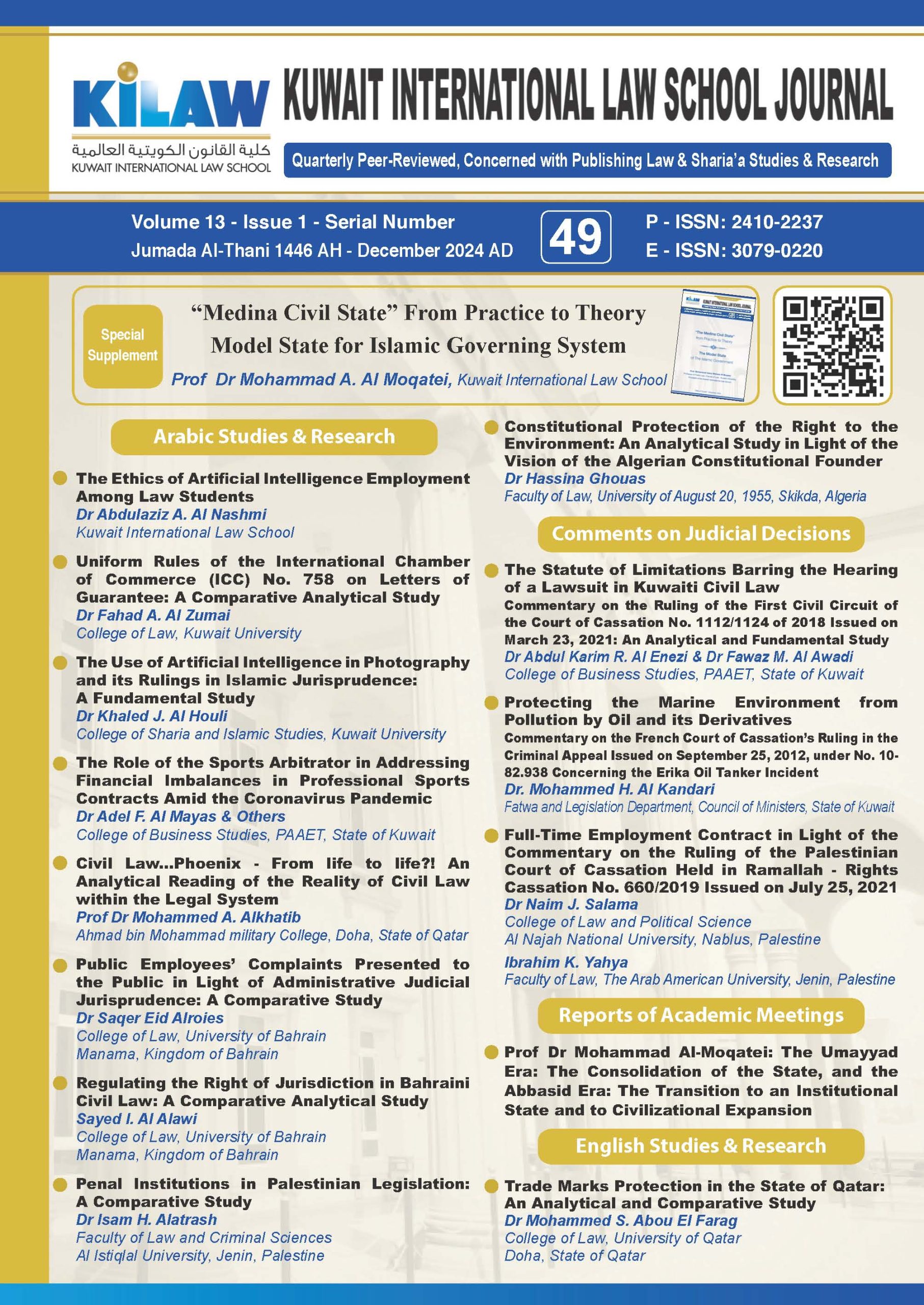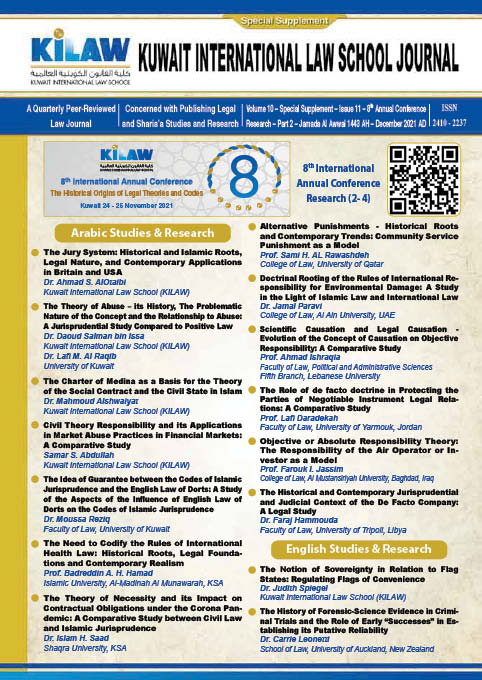Chief-in-Editor Prof. Badria A. Al-Awadi
{O humanity! Indeed, We created you from a male and a female, and made you into peoples and tribes so that you may ˹get to˺ know one another. Surely, the most noble of you in the sight of Allah (God) is the most righteous among you. Allah is truly All-Knowing, All-Aware.} (Sourat Al-Hujurat, verse 13)
Relations between states constitute a mirror reflecting the development of the role of laws in regulating life within the international community, a role that intersects in many aspects with the role of law in local societies and within a single state, but differs from it according to its parties and units. International law views states as equals, grants them sovereignty over their lands, territorial waters, and airspace. It does not allow aggression against them or interference in their internal affairs. The rules of this law appeared successively in the form of charters, agreements, and declarations of principles and rights, after a difficult period of labour that witnessed tragic wars and conflicts, which claimed the lives of tens of millions of people in the First and Second World Wars, in addition to the wars of colonialism and aggression.
Many of these rules find their origins and roots in historical theories and legal codes, which arose in the midst of conflicts between earlier nations to control resources and impose sovereignty, and in the predominance of the logic of wars, invasion and aggression, and then developed gradually and cumulatively in a development that took many centuries, to establish peace instead of war, and coexistence instead of conflict, adopting dialogue and negotiation instead of weapons to settle existing problems.
Heavenly laws in general, and Islamic law in particular, as it is the final, wisest, fairest, and most comprehensive of all messages and laws, has contributed to raising awareness of the importance of the values of coexistence and understanding between human societies, and rejecting division and aggression, as the Almighty said in a decisive revelation:
{And cooperate in righteousness and piety, but do not cooperate in sin and aggression}, (Surat Al-Ma’idah, verse 2)}. He also said: {And do not transgress, for God does not love transgressors} (Surat Al-Ma’idah, verse 87).
These provisions were mirrored on the ground by the example of the state of Medina established by the Messenger of God, may God’s prayers and peace be upon him, and later in Mecca after its conquest, and then in the rest of the cities that the Muslims opened and ruled, where the values of brotherhood and affection, justice and equality prevailed, and security, stability and prosperity spread in these zones for a period of time, due to adherence to the values and principles included in the provisions of the Sharia, and the jurisprudence reached by the caliphs, scholars and jurists.
The two historical legal schools, Latin and Anglo-Saxon, also contributed to the emergence of many theories and rules of international law, based on the experience of the Roman Empire and the principles and ideas of Roman philosophers, and then the philosophers and thinkers of the Age of Enlightenment, some of whom lived through dark periods in the history of civil and inter-war wars in Europe and the United States of America. And other wars of colonialism, aggression, and control in the eighteenth and nineteenth centuries, especially the first and second world wars in the twentieth century.
The development of international law culminated in the emergence of a number of declarations, covenants, conventions, and protocols, which followed World War II, most notably: the United Nations Charter (1945), the Universal Declaration of Human Rights (1948), the Geneva Conventions (1949), and its subsequent protocols, and others. International efforts have also been active to formulate and adopt multilateral agreements aimed at encouraging the resolution of problems and disputes through dialogue and negotiation and by avoiding wars.
There is no doubt that these efforts and initiatives have achieved some results, but data on the ground indicate the limited impact of the repository of international laws and agreements in curbing the aggressive tendency inherent in a number of international parties that do not hesitate to use force to achieve their interests, and to interfere in internal affairs of countries, and impose their conditions by force. In addition to the fact that this situation has led to instability in many regions of the world, it has engendered more and more doubts about the binding force and even the very existence of the rules of international law, due to the increasing violations and disrespect of them by the major powers, based on the fact that laws require force to compel the implementation of its provisions, which is not available for many of the rules and provisions of international law, especially when major powers are involved, as confirmed by successive facts.
In view of the common needs of human societies towards strengthening international peace and stability in order to address the real problems that threaten the future of humanity (climate – hunger – depletion of resources …), many parties, at the forefront of whom responsible states and governments, as well as international organizations and jurists of international law, are invited to dwell again on reviewing mechanisms for activating respect for the rules and provisions of international law, and the need to adhere to them to include everyone without exception.



